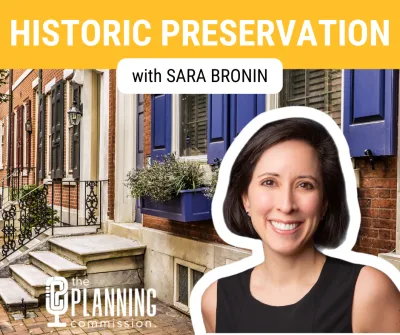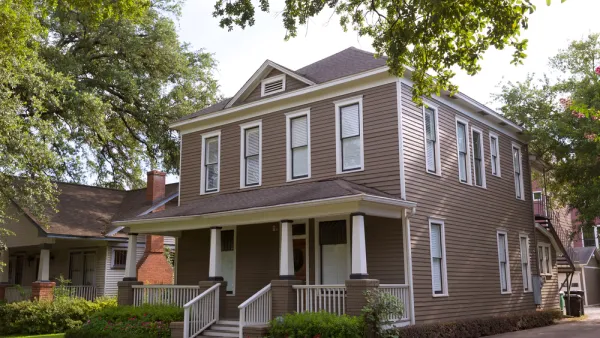Sara Bronin was recently appointed by President Biden to chair the ACHP. In this episode she takes us back to the future on what historic preservation means to American cities and what planners can do to balance preservation with contemporary needs.

We all love historic Main Streets and what they mean to a community. The desire to preserve the feel of such places is at the root of many local historic preservation efforts. The upper floors of those Main Street buildings are also part of that Main Street’s history, with many built as housing that has since been zoned out as a permitted use.
That’s where historic preservation, planning, and affordable housing can come together to address community needs while honoring our history, according to Advisory Council on Historic Preservation (ACHP) Chair Sara Bronin.
Bronin views preservation and community goals like housing affordability as endeavors that go hand-in-hand. “Preservation looks at the exterior of the building, while zoning looks primarily at the uses inside the building,” Bronin told The Planning Commission Podcast. “If we allow people to convert existing buildings into two-unit, three-unit, four-unit or multi-unit dwellings, that’s something that could help. If we’re locking the outside in stone, we don’t have to lock the inside in stone.”
Bronin discusses efforts beyond Main Street to help address housing needs, such as converting historic mill properties in Connecticut and elsewhere into housing and office space. “Those are often zoned for industrial developments only.”
As ACHP’s leader, Bronin addresses how the agency is adapting its definition of historic preservation. While the preservation movement in the United States was founded on desires to protect the properties of the Founding Fathers, it has evolved with the country to incorporate full neighborhoods, places of historical significance for women and diverse cultures. ACHP is now examining traditional cultural properties and how to adapt to climate change.
“One of the hot topics at fed level is how do we know something is significant?,” said Bronin. “Do we rely only on textbooks and people with doctoral degrees or do we actually rely on people with lived experience and knowledge about their communities.”
The Planning Commission is a spirited debate by planners, for planners. This independent outlet for all things planning explores the serious and lighter sides of the profession, poses probing and creative questions to guests, and always pairs the episode guest and topic with a choice libation. Listen to the podcast for a special offer from Planetizen.

Analysis: Cybertruck Fatality Rate Far Exceeds That of Ford Pinto
The Tesla Cybertruck was recalled seven times last year.

National Parks Layoffs Will Cause Communities to Lose Billions
Thousands of essential park workers were laid off this week, just before the busy spring break season.

Retro-silient?: America’s First “Eco-burb,” The Woodlands Turns 50
A master-planned community north of Houston offers lessons on green infrastructure and resilient design, but falls short of its founder’s lofty affordability and walkability goals.

Test News Post 1
This is a summary

Analysis: Cybertruck Fatality Rate Far Exceeds That of Ford Pinto
The Tesla Cybertruck was recalled seven times last year.

Test News Headline 46
Test for the image on the front page.
Urban Design for Planners 1: Software Tools
This six-course series explores essential urban design concepts using open source software and equips planners with the tools they need to participate fully in the urban design process.
Planning for Universal Design
Learn the tools for implementing Universal Design in planning regulations.
EMC Planning Group, Inc.
Planetizen
Planetizen
Mpact (formerly Rail~Volution)
Great Falls Development Authority, Inc.
HUDs Office of Policy Development and Research
NYU Wagner Graduate School of Public Service




























